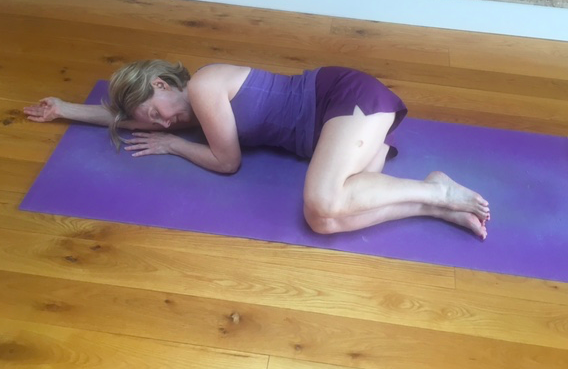Working Through the Pain: Priming Your Mind for Change

I don't know if you've noticed, but we humans don't always think or behave rationally, even when it comes to our own self-interest. In fact, we can be so stubborn that we stand by while watching our own self-destruction. Sure, we want to make positive changes in our lives, and may even know what to do, but often can't seem to overcome our inertia.
Changing your thinking, your emotions, and perhaps parts of your self-image may be necessary for becoming happier, healthier, more energetic, or achieving your ideal body weight. In the third installment describing my recent life transformation, I am sharing my progression through these steps (for the umpteenth time in my life), toward recovery from some difficult times.
Whether healing from an illness, surgeries, or even just experiencing a long run of being too busy to exercise or take care of yourself... Beginning again, becoming fit, or healthy can be a painful process and can seem almost impossible to achieve.
In my case, after knee and back surgeries, spending a good deal of time being sedentary, and even bed-bound, I tried jumping back into life too quickly many times. These false starts had the effect of delaying my healing, furthering my pain, exhaustion, and depression. I had to learn to take baby steps (funny, something I'm told I'm very good at helping my clients with while helping them improve their lives). I had to notice how my thinking, self-talk, emotions, and even my own identity were interfering with my successful recovery.
One of my revelations was that my self image as a fit and physically active person affected me negatively and slowed my progress for a couple of reasons. First, my inability to be physically active while recovering from surgeries made me perhaps more depressed than would be expected. That depression kept me from the world, isolated, and of course, we all know, that made my situation worse: physically and psychologically. Second, when I finally got the will to start moving, I didn't know how to start slowly. I jumped right in, taking difficult yoga classes and walking too much. That caused pain and discouraged me from continuing to try. And this prolonged my convalescence.
After many such failures, I decided to try joining the world again. But this time, taking my own advice and doing it one baby step at a time! For this to work, I had to change my thinking. It is the cornerstone of any behavior change: Noticing your thoughts and deciding how to react to them. I decided it was time to notice the negative thoughts in my head that led to counterproductive behavior. Noticing self-defeating - and irrational - thoughts, such as "I'll never be myself again," or "I don't want to go out and be seen unless I'm completely back in shape," allowed me to change them to more rational and productive thoughts, such as, "of course, I'll always be myself! And, besides, a little improvement is good for anyone," or "people will still accept and like me, even if I'm not in great shape." This officially is "cognitive therapy," an accepted pre-requisite for behavior change, and one I use extensively to help my clients. My willingness to begin this process allowed me to accept my humanness, my need to proceed slowly. I decided to share my experience after finding so many people were surprised that this process could be difficult for me, the "expert." I also wanted to share my experience so others would feel assured that this transformation is possible for anyone.
Before you can change the way you think, though, you'll need to develop a sense of urgency about your goal, if you haven't already. A sense of urgency, according to The Dalai Lama in "The Art of Happiness" – and scholars in this important field of psychological research, can be achieved two ways:
1) Remind yourself of your positive vision for success. For example, visualize yourself at your ideal fitness level, your goal weight, or see yourself feeling happy, healthy, energetic, and confident (see "Dream" in my book, Diet Simple), and
2) Ponder the negative consequences of not making a particular behavior change (a little fear can be a good thing – but just a little). I mean, after all, did I really want to feel terrible for the rest of my life? This may seem like an absurd question to ask yourself, but when your behavior doesn't lead to positive outcomes, what else could the counter-productive behavior mean? What outcomes could you possibly expect besides negative ones? You may try this yourself by asking, for instance, in the morning as you’re considering two options: getting out of bed to exercise or sleeping just a little longer, "Do I want to feel good today? Or do I want to feel crummy today?" Another example, as you're driving home from work and deciding to grab some carry-out or to go home to eat the healthy meal you've already planned. Ask yourself: “Do I want to achieve my weight loss goal (insert positive vision here) or will I accept being the same weight and having the same health problems for another year?” “Do I want to stop taking these darn medications or will I be taking them forever – and even increasing the dosage? What will my doctor say?” “What kind of example am I setting for my children, my spouse? Is this a behavior I can be proud of?” etc. You get the idea…
ACHIEVING INCREASED HAPPINESS
Outlining the consequenses of your actions and acting on your long term goals, as opposed to momentary desires, helps you grow as a person and become a happier person, according to scientific research. It increases your general happiness level because you are making decisions which contribute to your long-term goals.
THE DOWNWARD SPIRAL OF GIVING IN
Usually, when we do something that feels good momentarily, such as giving in and staying in bed for 30 more minutes of sleep in the morning instead of exercising, or grabbing a coffee cake at the coffee shop when we originally just planned on buying coffee, our happiness level may increase ("oooh, this feels yummy!") – but it's only a temporary blip of happiness. It goes back to the same level it did before - once the temporary experience wears off – and nothing changes for the better in our lives. We may even become more depressed as we continue to “give-in” to these unfulfilling momentary desires and dive into a downward spiral.
MAKING THE HARDER, BUT MORE SATISFYING CHOICE
If, instead, we say to ourselves, "I'm getting out of bed NOW! I'll feel terrible if I don't, and I'll never achieve my goals," or “Will stopping to get carry-out change my life for the better? I’d be better off going home and eating something healthy as I want to lose weight, lower my cholesterol, etc,” or “I really don’t need that coffee cake, and I’ll feel terrible after eating it, and will it make me happier at the end of the day?" "Will this increase my happiness for the short term? Or for the long term?" Another more extreme example might be a drug addict relapsing. It feels great momentarily, but the feeling doesn’t last.
When you make a more thoughtful decision, which contributes to your longterm health – physical or psychological – you are more likely to achieve your life’s hopes, dreams and goals, you can actually increase your happiness level, feel happier more often and grow as a person.
WHY IT'S NOT ALWAYS EASY
It is not always easy in our society to make the healthy decision. It's easier - and the norm, in fact - to be unfit, overweight and unhealthy. But, I'm convinced it is possible to be healthy in an unhealthy world with planning, practice, determination, and support (I'm here any time you need me!) - Besides, what's the alternative?
It takes effort to train your mind to work this way, but this is how we become better people and we advance as a society.





